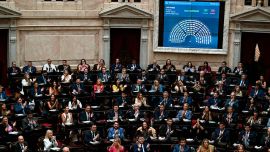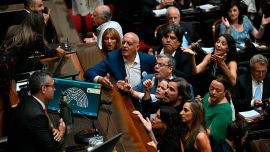Argentina's political leadership is going through a particular moment in which everything is a fight.
The great promoter of this present state of things, in which aggressiveness reigns among those who express different thoughts, is President Javier Milei, for whom anyone who thinks differently is simply an enemy. This is a real problem because it undermines the very concept of democracy. The idea of monolithic thinking represents the antithesis of it. This concept, which was installed by Kirchnerism when it came to power, has taken root in the President. And it is remarkable to see how the enemies feed off each other. It’s a story that’s as old as the history of mankind.
At the Instituto Patria think-tank, Cristina Fernández de Kirchner believes that the current government is reviving her. And in Milei’s government they celebrate the former president and vice-president’s appearances, because they perceive that this strongly favours them. We shall see.
CFK's recent 33-page letter demonstrates several things. The first is that she has plenty of free time on her hands. The second one is that her need for centrality is persistent. The third is that her will to do harm remains intact. The fourth is that her lack of self-criticism also remains intact. Fifth, the presence – which does not go unnoticed – of her usual confusions and conceptual errors. Sixth, her permanent contradictions. To all these we must add a seventh one that surprised us: her lack of timing. To have published the letter on the same day the inflation index was released was a mistake. "What a favour it did us!", said one euphoric voice from the ruling party.
Of course, the problems faced by the government are much more complex than CFK's letter. The President's persistence in wanting to break up any negotiations with almost the entire political spectrum shows that he has not yet understood that he is no longer in the middle of the heat of the electoral campaign. Today, Argentina’s government does not have the possibility of getting any bill passed by Congress. Even if it finally allied itself with Mauricio Macri’s PRO party, it would not have the numbers to reach the majorities needed to pass laws. The following reasoning hovers in the upper circles of La Libertad Avanza: "We will send shorter bills to the Parliament and when the opposition rejects them, we will take care in exposing them to society." They believe that by doing this – just as they did with the deputies who did not vote for the ‘Omnibus bill’ – will be enough to have them exonerated from any responsibility for the eventual failures of Milei's Presidency. The head of state is wrong if he believes that this is the only way to govern. He is also wrong if he thinks that the members of "the caste" are going to rip up everything in the face of alleged revelations that are already known to everyone. What makes one more spot on the tiger?
Earlier this month, Pope Francis offered Milei two very clear lessons: the importance of forgiveness and the value of listening to others. The pontiff’s affection for the President was a very powerful message not only for Milei but for Argentine society as a whole. There were no reproaches, no bad faces, no tensions – there were smiles, jokes and hugs that Francis encouraged and accepted. "Thank you for coming," he said to those who had described him as the representative of the "Evil One" on earth.
In their subsequent meeting, which was unusually long, the Pope – who has a different economic vision quite distinct from that of the President – listened to him with the utmost attention. From what was seen afterwards, Milei does not seem to have learned the lessons. To shut oneself off in one's own thoughts is like taking refuge in a glass box – not only because of its fragility, but also because of the possibility of being left out in the open for the whole world to see. Something similar happened to Macri during different periods of his term in office. He allowed himself to be monopolised – in attention and even in will – by his then-Cabinet chief Marcos Peña and he distanced himself from those who wanted to help him to hold office with a more accurate vision of reality. The former president should warn Milei that his attitude will not lead to a good outcome.
However, the current political situation – rich in sterile discussions between a totally fragmented opposition – makes the task of finding true allies difficult. The Juntos por el Cambio coalition no longer exists, while in PRO things are no longer as they used to be and the search for new leaders is stirring up internal fights. Within Radicalism there is nothing surprising – it is a party with leaders who yearn for power but are entrenched in a structure that does not renew itself and that drags with it all the vices of the old politics. Their limit is institutionality. In this they clearly differ from a large part of Peronism that does and will do anything to regain power. Within Unión por la Patria though, things are not much better. Fernández de Kirchner is still navel-gazing and watching her back, fearful of the legal cases that are hounding her. Her son Máximo Kirchner is once again an orphan caricature of power, with no horizon and no capacity to lead. Axel Kicillof barely endures the reality of Buenos Aires Province.
Kicillof is not finding it easy to govern the most complex district in the country. Those who saw in him a possibility of serious regrouping for Kirchnerism and Peronism are off. In this breeding-ground for disputes and conspiracies, Sergio Massa is waiting for his moment as a luxury spectator. That is why it is so important that Milei’s government do well. Argentina cannot afford to return to its old familiar ways. A past that torments and from which it would be very difficult to get out of.



















Comments